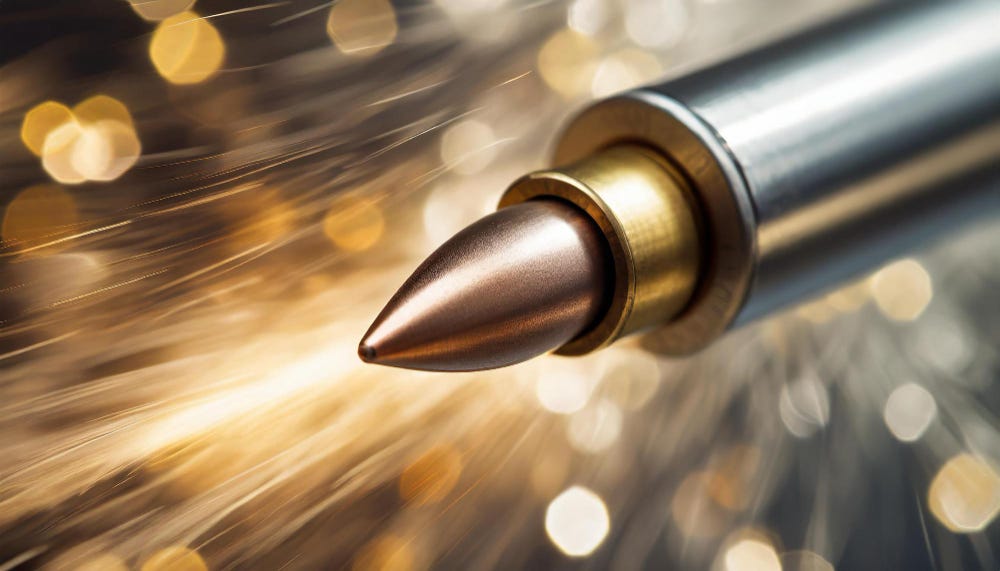Beijing could restrict tungsten by year end, Plus 98% of Chinese banks are declining Russian payments -- China Boss News 8.23.24
Newsletter -- *China Boss will take a two-week break starting Sept. 2nd.
What happened
CNBC reported last week that China's recent export controls on antimony, a critical mineral used in bullets, nuclear weapon production, and lead-acid batteries, are rattling the global industry, particularly the lead-acid battery sector, which heavily relies on antimony.
China's sudden decision to restrict antimony has caught industry professionals, including Lewis Black, CEO of Canada-based Almonty Industries, off guard, according to news staff, who reported that the measures would take effect next month.
In a recent phone interview, Black told CNBC that such a decision was unthinkable three months ago.
"The move by China is difficult to comprehend, and it seems to have rattled a lot of people in this sector including my customers, who do not have an alternative plan," Black said.
"There has always been a balance ... these minerals were never weaponized due to the potential for an escalating conflict," he added.
Why it matters
Trending to state-backed dominance
Industry professionals like Black are expressing mounting concern over China's escalating export controls on critical minerals, fearing they could lead to unprecedented curbs.
In December, China implemented a new rule requiring government authorization to export graphite, a crucial component for electric vehicle batteries, amid US semiconductor restrictions on its tech sector and an EU inquiry into subsidies for China-made electric vehicles (EVs).
When the world's largest producer impedes the flow of crucial lithium-ion battery anode raw materials like graphite, folks take notice.
Industry professionals and government officials who have long warned about the risks of over-dependence in critical minerals now say diversification is urgent.
China's newly imposed export limitations follow similar restrictions imposed in August on materials used in chip manufacturing, like gallium, and stricter controls in November targeting rare-earth metals, requiring exporters to report transaction details, according to Nikkei Asia.
News staff also noted the expansion of Chinese EV battery anodes manufacturers into new markets abroad, causing fears that Chinese businesses operating overseas may receive preferential treatment while foreign companies may face challenges in purchasing materials.
"A total of 17 Chinese battery material makers have announced plans for 22 overseas factories this year, spending over 100 billion yuan ($14 billion)," Nikkei Asia said, citing Chinese media.
Chinese industry professionals have made no secret of their state-led objective: to become a major player in the global automotive and tech industries.
In September 2023, top battery-materials maker Ningbo Shanshan revealed its intention to allocate a maximum of 1.28 billion euros ($1.39 billion) to construct an anode factory in Finland to achieve mass production within two years.
Chairman Zheng Ju later told an international audience, "Under the national strategy to become a major automotive power, upstream and downstream companies are making an effort to develop a supply chain together."
Weaponizing tungsten
More worrisome is the potential escalation of China's export controls on critical minerals, with experts foreseeing an ominous trend towards tungsten, a mineral almost as hard as a diamond.
Although the defense industry relies heavily on antimony as a critical component in armor-piercing ammunition, night vision goggles, infrared sensors, and precision optics, tungsten is used to speartip missiles, in semiconductor production, and industrial cutting.
Tony Adcock, executive chair of Tungsten Metals Group, told CNBC that "he found it hard to believe that China would just restrict antimony."
"The way that the [Chinese Commerce Ministry] statement was written, we've extrapolated that to tungsten and other rare earths. [But it] may not happen," Adcock said, citing tungsten's high "economic importance."
China's Commerce Ministry spokesperson, He Yaodong, explained the new antimony export controls to reporters at a news briefing, saying they were implemented to safeguard national security and were not directed at any specific country.
However, when asked "about the possibility of imposing controls on tungsten,” He refused further detail, reiterating that "China would manage exports in accordance with national laws and regulations," CNBC staff said.
Christopher Ecclestone, principal and mining strategist at Hallgarten & Company, also stressed the implications of possible Chinese export controls on tungsten.
"China has a declining tungsten production, but tungsten is absolutely vital, far more than antimony, in military applications. During a situation where there's a bit of a race to secure metals in case there is some sort of flare up in tensions, frankly we talk about South China Sea or Taiwan, you want to have as much tungsten as you can," he said.
Ecclestone forecast that "China will put export controls on tungsten by the end of the year, if not in the next month or two."
This Week's China News
The Big Story in China Business
98% OF CHINESE BANKS ARE DECLINING RUSSIAN PAYMENTS, BUSINESS INSIDER: The commercial director of a major Russian payments company told Russian media that 98% of Chinese banks are declining direct Chinese payment transfers from Russia, Business Insider reported.
Their refusal has put Russian firms in a precarious position, with smaller Chinese
Keep reading with a 7-day free trial
Subscribe to China Boss News to keep reading this post and get 7 days of free access to the full post archives.




